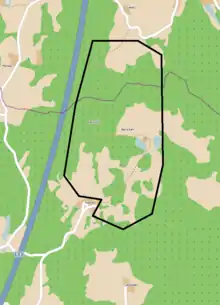Norra Kärr
Norra Kärr or Norra Kärr Alkaline Complex is an intrusive complex cropping out at the boundary between Östergötland and Småland, Sweden.[1][2] The complex is chiefly made up of peralkaline nepheline syenite and is rich in exotic minerals.[1] Rocks of the complex intruded into the Paleoproterozoic-aged Växjo granites of the Transscandinavian Igneous Belt.[1][2] Alfred Elis Törnebohm was the first to describe the rocks of Norra Kärr in 1906. Norra Kärr was discovered a few years earlier during regional geological maping by the Swedish Geological Survey. The complex derives its name from a local farm, which translates into English as "Northern Fen".[2] In 1968 Harry von Eckermann published his investigations on the complex defining its boundaries and confirming the view of it as an intrusion.[3]
A study has shown that the elevated rare-earth element concentrations in the bedrock in the Norra Kärr area are particularly well reflected in high contents of these elements in the fern Dryopteris filix-mas. This raises the possibility for the fern species to be used in biogeochemical prospecting.[4]
Norra Kärr is one of the two known sites where the mineral jinshajiangite can be found naturally, the other being in China.[5][6]
Mine project
 | |
| Location | |
|---|---|
| Jönköping County | |
| Country | Sweden |
| Production | |
| Products | Rare earth elements and Zirconium |
The Norra Kärr mine project represents one of the largest zirconium reserves in Sweden having estimated reserves of 58 million tonnes of ore grading 1.7% zirconium metal.[7]
Since 2009, the Canadian company Tasman Metals has owned the mining rights and explored for rare earth elements in the Norra Kärr area.[8][1]
In February 2016 the supreme administrative court of Sweden withdrew Tasman's exploitation concession for Norra Kärr.
References
- "Report on the Geology, Mineralization and Exploration Potential of the Norra Kärr Zirconium-REE Deposit, Gränna, Sweden" (PDF). Tasman Metals Ldt. Archived from the original (PDF) on 2014-02-07. Retrieved 2013-01-04.
- Sjöqvist, Axel S.L.; Cornell, David H.; Andersen, Tom; Erambert, Muriel; Ek, Mattias; Magnus, Leijd (2013). "Three Compositional Varieties of Rare-Earth Element Ore: Eudialyte-Group Minerals from the Norra Kärr Alkaline Complex, Southern Sweden". Minerals. 3 (1): 94–120. doi:10.3390/min3010094.
- von Eckermann, Harry (1968). "New contributions to the interpretation of the genesis of the Norra Kärr alkaline body in Southern Sweden". Lithos. 1 (1): 76–88. doi:10.1016/S0024-4937(68)80037-4.
- Bluemel, Britt; Leijd, Magnus; Dunn, Colin; Hart, Craig J.R.; Saxon, Mark; Sadeghi, Martiya (2013). "Biogeochemical expression of rare earth element and zirconium mineralization at Norra Kärr, Southern Sweden" (PDF). Journal of Geochemical Exploration. 133 (15–24).
- Holtstam, Dan (1998). "Jinshajiangite from the Norra Kärr alkaline intrusion, Jönköping, Sweden". GFF. 120 (4): 373–374. doi:10.1080/11035899801204373.
- Rastsvetaeva, R.K.; Chukanov, N.V.; Rozenberg, K.A. (2008). "Crystal Structure of Jinshajiangite from the Norra Kärr Complex (Sweden)". Crystallography Reports. 53 (4): 553–556. doi:10.1134/S1063774508040044.
- "Norra Kärr mine" (PDF). tasmanmetals.com. 2012. Retrieved 2013-07-05.
- "Gränna kan bli nästa gruvort". Archived from the original on 2012-10-18. Retrieved 2017-07-26.
External links
- Bryta jordartsmetaller i Norra Kärr? - Presentation av Olov Holmstrand, 2016-04-02 (in Swedish), Naturskyddsföreningen i Tranås [Swedish Society for Nature Conservation in Tranås]
- Vattnets väg från Norra Kärr - Presentation av Stellan Hamrin, 2016-04-02 (in Swedish) Naturskyddsföreningen i Tranås [Swedish Society for Nature Conservation in Tranås]